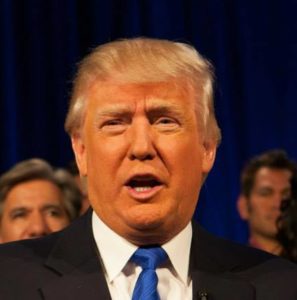Supreme Court partially reinstates Trump’s travel ban
June 26, 2017

President Donald Trump
The Supreme Court ruled Monday that President Donald Trump’s “travel ban” can take effect, albeit with exceptions allowing some individuals from targeted countries to enter the United States. [USA Today]
Monday’s ruling states Trump may bar individuals from six Muslim majority countries — Iran, Libya, Somalia, Sudan, Syria and Yemen — if they do not have a “bona fide” relationship with a person or entity in the United States. Travelers who have close relatives who are United States citizens; have been accepted at a United States university; or have been given a job to to work at a United States business are examples of people with bona fide relationships, according to the Supreme Court.
“The interest in preserving national security is, ‘an urgent objective of the highest order,’” the Supreme Court Justices wrote. “To prevent the government from pursuing that objective by enforcing (the travel ban) against foreign nationals unconnected to the United States would appreciably injure its interests, without alleviating obvious hardship to anyone else.”
Justices Clarence Thomas, Samuel Alito and Neil Gorsuch indicated they would have allowed the ban to apply to all travelers from the six targeted countries.
The Supreme Court’s ruling reverses prior decisions by lower courts. Many commentators are calling it a victory or partial victory for the Trump Administration.
In January, Trump signed an initial executive order banning all travelers from seven countries from entering the U.S., even if they had green cards, visas or asylum. The initial order included Iraq on the list.
Multiple federal judges then blocked the order.
In March, Trump issued a revised travel ban barring most new immigrants from six predominantly Muslim countries for 90 days and halting the acceptance of refugees for 120 days. The revised travel ban exempted visa and green card holders, eliminated a provision giving preference to Christian minorities and included a waiver process for travelers claiming undue hardship.
Before the case arrived at the Supreme Court, the 4th Circuit U.S. Court of Appeals ruled 10-3 that the travel ban discriminated against Muslims, and the 9th Circuit U.S. Court of Appeals ruled unanimously that it violated federal immigration law by targeting certain people without improving national security.
Following the Supreme Court ruling, the reformed travel ban can take effect as soon as Thursday.






The comments below represent the opinion of the writer and do not represent the views or policies of CalCoastNews.com. Please address the Policies, events and arguments, not the person. Constructive debate is good; mockery, taunting, and name calling is not. Comment Guidelines